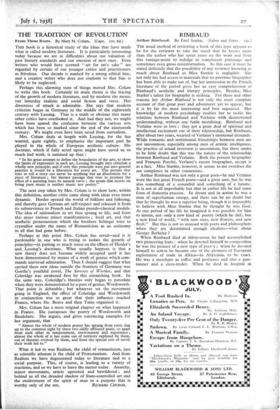THE TRADITION OF REVOLUTION
what is called modern literature. It is particularly interesting toddy because we are in difficulties about our valuation of past literary standards and our erection of new ones. Even Writers who would have scorned " art for art's sake " are. regarded by certain of our younger critics and practitioners as frivolous. Our decade is marked by a strong ethical bias, and a creative writer who does not conforni' to that bias is likely to be neglected.
Perhaps this alarming state of things moved Mrs. Colum to write this book. Certainly its main theme is the tracing of the growth of modern literature, and by modem she means our latterday realistic and social fiction and verse. Her directness of attack is admirable. She says that modern criticism began in Germany in the middle of the eighteenth century with Lessing. That is a truth so obvious that many other critics have overlooked it. And had they not, we might have been spared the confusion between the various arts which has been so marked since the end of the nineteenth century. We might even have been saved from surrealism. Mrs. Colunn deals at length with Lessing, for she has wanted, quite rightly, to emphasise the important part he played in the whole of European aesthetic culture. His doctrine, which if fully acted upon might have saved us so much bad work, is summed up thus " In his great attempt to define the boundaries of the arts, to show the limits of expression in each art, Lessing brought into criticism a wholly new principle, and if only this principle were put into general practice it would be a liberation for every art. The picture that tries to tell a story can -never be anything but an illustration for a piece of literature ; the literary passage that tries to produce the effect of a painting loses its natural verve ; the poem that insists on being pure music is neither music nor poetry."
The next step taken by Mrs. Colum is to show how, within this definition, another critic came along with ideas even more dynamic. Herder opened the world of folklore and folksong,
and thereby gave German art self-respect and released it from its subservience to French and Italian pseudo-classical models. The idea of nationalism in art thus sprang to life, and from this arose various minor manifestations ; local art, and, that aesthetic protestantism which the brothers Schlegel were to
crystallise under the name of Romanticism as an antinomy to all that had gone before.
Perhaps at this point. Mrs. Colum has erred—and it is pardonable in one who is trying to isolate the growth of principles—in putting so much stress on the effects of Herder's and Lessing's doctrines. What usually happens is that a new theory does not .become widely accepted until it has
been demonstrated by means of a work of genius which com- mands universal admiration. Thus I should suggest that what carried these new ideas outside the frontiers of Germany was Goethe's youthful novel, The Sorrows of Werther, and that Coleridge was awakened first by this astonishing book. In the same way, Coleridge's theories only began to percolate when they were demonstrated by a poet of genius, Wordsworth. That point is debatable ; but whatever set the movement going in England, the effect of Coleridge and Wordsworth in conjunction was so great that their influence reached France, where Ste. Beuve and then Taine organised it.
Mrs. Colum has a most original chapter on what happened in_ France. She juxtaposes the poetry of Wordsworth and Baudelaire. She argues, and gives convincing examples for her argument, that
" Almost the whole of modem poetry has sprung from roots dug up to the common sight by these two oddly affiliated poets, so apart from each other in temperament, environment and experience ; almost the whole of it has come out of territory explored by them, Out of theories evolved by them, and from the special sort of revolt their work led to."
What it led to was Realism, the child of romanticism, just as scientific atheism is the child of Protestantism. And from Realism we have degenerated today to literature tied to a social purpose. This, of course, is leading to a variety of reactions, and so we have to leave the matter today. Anarchy, minor movements, artists uprooted and bewildered ; and behind us all the dreaded shadow of State-controlled art and the enslavement of the spirit of man to a purpose that is


















































 Previous page
Previous page